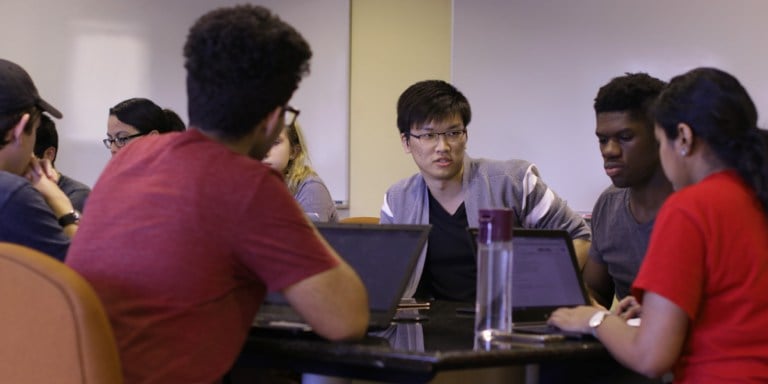The 18th Undergraduate Senate approved a bill to commit a maximum of $35,000 to a new program to subsidize student group dues for low-income students, pending a comprehensive fund allocation plan. First proposed to the last Senate by Joshua Seawell ’18, the bill was stalled due to concerns about the exclusive nature of the student organizations involved and the lack of details on fund use.
The Senate also heard a student complaint on the lack of transparency in the selection process for student representatives to the Stanford Board of Trustees.
Student group fee subsidy for low-income students
Seawell took the bill to subsidize dues for low-income students before the 18th Senate for the second time, following the Senate’s refusal to approve the requested $30,000 in funds upfront. Instead, the Senate had voted to establish a working group to first design a detailed budgeting plan before deciding on funds.
While Seawell hoped that the Senate would appropriate the funds immediately, the Senate was reluctant to commit without a detailed scheme. The hour-long debate focused on the urgency of the fund transfer, the Senate’s political process as well as the financial implications of the different funding timelines.
“I’m frustrated by your criticism of our evolving bill when we keep evolving and responding to your feedback,” Seawell said. “Every form of the bill seems to be unacceptable for whatever reasons are convenient at that time.”
He explained that he was reluctant for the Senate to vote on the funds alongside the working group’s budgeting proposal lest the working group feel pressured to propose a popular solution rather than a practical one.
“We have certain funding guidelines and principles in the Senate, and one of those is that we don’t give money away unless you have a detailed explanation of how it’s going to be spent,” Senator Matthew Cohen ’18 argued. “Every group is held to the same standard, and I don’t think we should see it any differently.”
Cohen and Senator Hattie Gawande ’18 also quoted Dr. Joseph Brown, associate director of the Diversity and First-Gen Office (DGen), as saying that the funds were not urgently needed.
However, Senator Khaled Auonallah ’19 pointed out that delaying funding until next quarter could mean that Greek organizations with fall quarter pledge seasons might see the earlier pledge class miss out on aid.
Senator Jasmin Espinosa ’18 ultimately offered a solution to the long debate by proposing that the Senate commit to a maximum funding cap of $35,000, although they would also vote on the exact funds along with the working group’s concrete plan.
Espinosa has had experience working with DGen to pilot a meal subsidy scheme for low-income students staying on campus over spring break.
“Even if we don’t transfer the money right now, DGen has the money to front [the funds] in fall. They have their opportunity fund,” She pointed out. “However, I do think it will be hard for a pilot project like this to have exact numbers upfront.”
During their open forum, the Senate heard a complaint from Yasmin Bashirova ’17, who sought reform in the Nominations Commission (NomCom) selection process to better represent the full range of student concerns.
Each year, the Nomination Commission (NomCom) nominates two student representatives to the Board of Trustees, while a Board committee decides whether to accept the nominations. Bashirova claimed that she had made it past the first round of interviews, but was never contacted for the second round.
Senators Gawande and Cenobio Hernandez ’18 decided to follow up with Bashirova to clarify and consider further action on hre claims.
Finally, the Senate passed a bill to appoint Ben Gaiarin ’19 as sophomore class president after a member of the elected team decided to take a leave of absence for personal reasons.
Contact Fangzhou Liu at fzliu96 ‘at’ stanford.edu.
